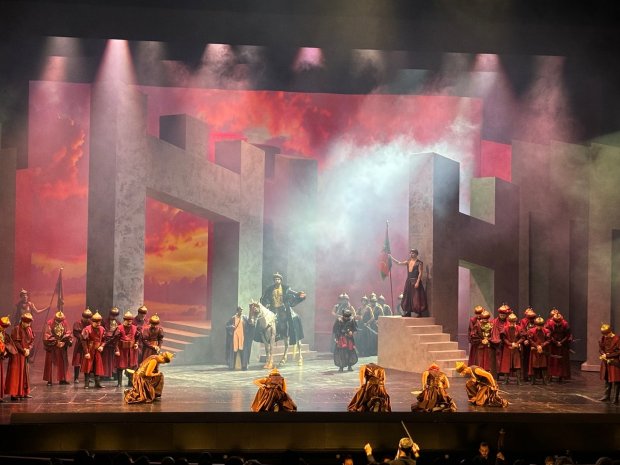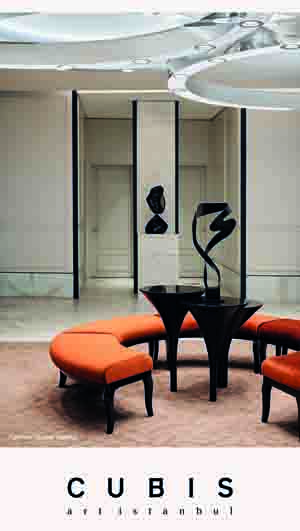It had been far too long since I had been to the opera in Istanbul, so on February 28 I made a visit to the Atatürk Cultural Centre to attend a performance of Gioachino Rossini’s two-act opera Maometto Secundo (‘Mehmet II’), first performed in Naples in 1820. Suffice it to say – for the moment – that I was bowled over both by the skill of the performers and by the care and expertise that had patently gone into staging the event. One might legitimately expect the Turkish State Opera and Ballet Company to go to great lengths to make a production featuring Fatih Sultan Mehmet (‘Mehmet the Conqueror’) worthy of his name, but I was not just pleasantly surprised by its quality, but pleasantly shocked.
The libretto of Maometto Secundo was the work of Cesare della Valle, Duke of Ventignano, and was based on his 1820 drama tragedy Anna Erizo. Although the plot would no doubt give rise to hoots of laughter in Turkish historians, it is nevertheless an ingenious one. It revolves around an entirely imaginary incident that takes place in 1470, while the Ottomans and the Venetians are at war in Greece. The Ottomans, under Sultan Mehmet II’s personal command, are laying siege to Negroponte (present-day Chalkis), the main city in Euboea. At that time this large island, located off the east coast of Greece and known in Turkish as Eğriboz, is under Venetian rule. We learn that earlier, while Mehmet was in Corinth, he and a Venetian girl fell in love. Mehmet was – of course – in disguise on that occasion, so the girl still has no idea that her long-lost lover is in fact the man whose armies have recently conquered Byzantium.
Mehmet demands the city’s immediate surrender, and there is great consternation inside its walls. Erisso, the Venetian Governor, takes his daughter Anna aside and suggests that she marry Calbo, his trusty military commander, as additional protection from the much-feared besiegers. Anna declines this proposal, explaining that while she was in Corinth and her father was away in Venice, she fell in love with a man named Uberto. Her father then reveals the awful truth: the real Uberto accompanied him to Venice, so the man she fell in love with must have been an impostor. Anna realises that she has been duped. Erisso then hands her a dagger with which to defend herself in case of need. (Spoiler alert: this is not the last time we will be seeing this fatal weapon.)
A cannon shot is heard, and Erisso and Calbo depart in haste to fend off the assault. Thanks to the dastardly efforts of a traitor who opens the gates to the Ottomans, however, it does not take long for them to capture the city. Erisso and Calbo, who have been taken prisoner, are led into Anna’s presence in chains. Then Mehmet appears, and Anna immediately recognises him as the man she fell in love with. There are tender scenes in which the lovers share some intimate moments in private, but Anna is torn between her love and her duty to her father, and things do not end well. I will give no clues as to the precise nature of the ending, but feel obliged to point out that the performance we witnessed in Istanbul was faithful to Rossini’s original intentions. In other words, it followed the initial version that was staged in Naples in 1820, and did not replicate the changed version with the happy ending that he felt obliged to supply for the second production – which took place, this time in Venice, in 1822.
Although Maometto Secundo has been described by modern critics as ‘in some ways his [i.e., Rossini’s] most ambitious opera’, and as being ‘extraordinary for its dramatic power and the nobility of its musical content’, it did not find favour with the audience at its first performance. One of the main reasons for their disapproval was the tragic ending, and Rossini – bowing to the expectations of Venetian opera-goers – rewrote it in accordance with their tastes, giving the work a happier conclusion. This turned out to have been a good move: when Maometto Secundo was staged in Paris in 1826 (translated into French under the name Le siège de Corinthe and with even more revisions), it was well received. At that time, of course, the Greek War of Independence had begun, so the theme of the work was a topical one. Subsequent to further performances in Vienna, Milan and Lisbon during 1823-1826, however, it fell into obscurity, and surfaced again only when revived (in the changed version) by the Metropolitan Opera in 1976.
Maometto Secundo received its first performance in Turkey, again by the Istanbul State Opera and Ballet, in 1990. Then, in 2010, it was staged as part of the International Istanbul Opera Festival, timed to coincide with the city’s tenure of the role of ‘European Capital of Culture’. The current production is the work of the distinguished Italian director Renato Bonajuto. Indeed, everyone concerned – including Tan Sağtürk (General Manager and General Artistic Director of the Istanbul State Opera and Ballet), Caner Akgün (the company’s Manager and Artistic Director) – is to be heartily congratulated on a job well done. I found Zeki Sarayoğlu’s set designs, with their imaginative backdrops, most impressive; in particular, I enjoyed the slow march of reddening clouds across evening skies, a decorative feature made possible (I would imagine) by projection techniques that were not available until recently. Gizem Betil’s costumes, meanwhile, were – unlike those of many non-Turkish productions, I have to say – both aesthetically pleasing and appropriate for the period.
As a music critic, I was of course on the lookout for co-ordination issues between the singers on the stage and the orchestra down in the pit. It is difficult enough to keep time when everyone can actually eyeball each other; when the instrumentalists are unable to see the singers they are accompanying, however, this task becomes vastly more difficult. Consequently, I must record my appreciation of the fact that Zdravko Lazarov, the orchestra’s conductor, succeeded in keeping everyone in sync. There were, understandably, one or two lapses when the two choruses (male and female) got slightly ahead, but in the main things went swimmingly. The singers in the main roles (especially Dilruba Bilgi, who played Anna – a marathon role) were excellent throughout, and the professionalism of the choruses was absolutely outstanding. Indeed, their performance was one of the most pleasing features of the opera as a whole; this was thanks, no doubt, to their training by Paolo Villa. In fact, I can say with certainty (as someone who has trained choruses himself in the past) that they were among the finest I have ever witnessed. When we were comparing notes after the performance, the French gentleman sitting next to me described them as ‘magnifique’, and I fully concurred with his judgement.
One of the highlights was, of course, the arrival on stage of Sultan Mehmet riding on a white horse, an event that the audience applauded with wild enthusiasm. In spite of the shouting of voices and blarting of trombones and trumpets that was going on all around him, the horse (held by a groom, of course – sensible move) betrayed few signs of nervousness, only stamping one of his back feet from time to time. Another was the scene in the Sultan’s harem in which the Turkish women try to soften Anna’s heart with regard to Mehmet’s proposal of marriage. It was here that dancers took the stage waving large, and suitably diaphanous, veils in well-coordinated graceful movements. (Choreography for this opera, by the way, was provided by Nil Berkan.)
No recording of Maometto Secundo can hope to reproduce the excitement that was generated in the audience by the performance in Istanbul on February 28th. For those who wish to find out what the work is like, however, here is a rendition (of the version with the happy ending) in the Teatro La Fenice in Venice, where the opera’s second performance took place in December 1822.
All in all, I was most encouraged by this event. It showed that in terms of excellence both in the performance of classical music and in the staging of operas, Turkey has come a long way in recent years. It was abundantly clear, moreover, that everyone concerned in the production of this particular opera had put in their very best efforts, and I am grateful to them for this.
From the sublime to the ridiculous, perhaps, but I am bound to record that when my companion and I left the Atatürk Cultural Centre in Taksim Square, it took us a very long time to find a taxi. It transpired that a football match in the Dolmabahçe Stadium down below had just finished; as a result, all highways – and byways – in the Beyoğlu-Beşiktaş area were jammed solid. When we did eventually find a vehicle to take us home, the traffic was so bad that it took us an hour to get along the coast road to Karaköy. I would normally find this situation irksome, but on this occasion it passed over me almost unnoticed as I went over Rossini’s tunes in my head and brought the colourful scenes I had witnessed to mind. Mindless euphoria, you may say, but is not opera itself an exercise in make-believe? The illusion is so powerful, and so pleasant, that Istanbul traffic just washes over one like a mountain stream...








